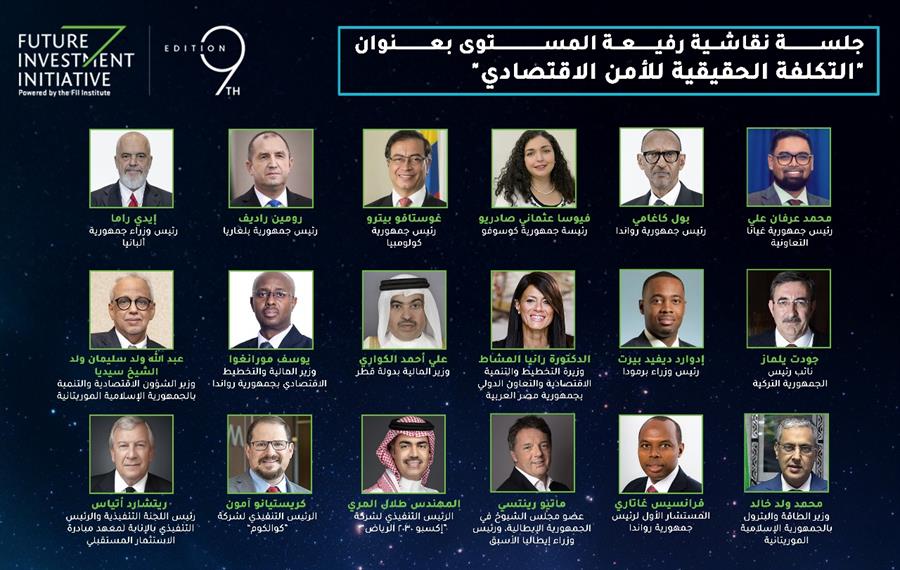Minister of Planning, Economic Development and International Cooperation Participates in a High-Level Session on “What’s the True Cost of Economic Security?” Attended by Heads of State, Government Leaders, and Ministers of Economy

30 October 2025
During the Future Investment Initiative Conference in Riyadh
Minister of Planning, Economic Development and International Cooperation Participates in a High-Level Session on “What’s the True Cost of Economic Security?” Attended by Heads of State, Government Leaders, and Ministers of Economy
Dr. Al-Mashat: Reducing geopolitical tensions strengthens the economic security of nations.
Achieving global economic security requires financial and investment partnerships that align national and global interests.
Strengthening coordination between international efforts and national priorities is essential to building more resilient economies capable of withstanding shocks.
H.E. Dr. Rania A. Al-Mashat, Minister of Planning, Economic Development and International Cooperation, participated in a high-level discussion session titled “What’s the True Cost of Economic Security?” during the ninth edition of the Future Investment Initiative (FII) Conference, held at the King Abdulaziz International Conference Center in Riyadh under the theme “The Compass of Prosperity.” The conference runs until October 30.
The session was chaired by Dr. Mohamed Irfaan Ali, President of the Cooperative Republic of Guyana, and included Paul Kagame, President of the Republic of Rwanda; Vjosa Osmani-Sadriu, President of the Republic of Kosovo; Gustavo Petro, President of the Republic of Colombia; Rumen Radev, President of the Republic of Bulgaria; Edward David Burt, Premier of Bermuda; and Edi Rama, Prime Minister of the Republic of Albania.
The session also featured Matteo Renzi, Member of the Italian Senate and former Prime Minister of Italy; Ali Ahmed Al-Kuwari, Minister of Finance of the State of Qatar; Cevdet Yılmaz, Vice President of the Republic of Türkiye; Yusuf Murangwa, Minister of Finance and Economic Planning of the Republic of Rwanda; and Abdallah Ould Sidiya, Minister of Economic Affairs and Development of the Islamic Republic of Mauritania, along with representatives from governments and the private sector.
During her remarks, H.E. Dr. Rania Al-Mashat emphasized that investing in economic security and enhancing resilience represents a global public good. This, she noted, requires aligning global financing and investment with national priorities to ensure balanced and sustainable impact. She underscored that greater coordination between international efforts and national agendas is the optimal path toward building economies that are more capable of withstanding global shocks.
Dr. Al-Mashat added that achieving global economic security depends on financial and investment partnerships that harmonize national and global interests, and that reducing geopolitical tensions across the world strengthens nations’ economic security.
In her address, the Minister spoke about the impact of growing trade tensions and protectionist policies on global supply chains. She stressed the importance of enabling countries to adapt to shifts in global trade while balancing the pursuit of national interests with the shared goal of collective prosperity.
Dr. Al-Mashat also highlighted the need to preserve multilateral cooperation mechanisms, which remain central to empowering nations to act collectively in addressing global challenges.
The Minister discussed the challenges facing foreign direct investment (FDI), as reflected in recent UN reports, which point to the negative effects of global tensions on investor confidence. She called for clear investment guarantees and incentives to encourage capital inflows into various sectors, thereby expanding fiscal space for greater investment in human development.
Dr. Al-Mashat further noted that digital transformation and unprecedented investments in technology can boost e-commerce and create new exportable industries—particularly in clean energy sectors such as solar panel manufacturing and other supporting industries.
Concluding her remarks, Dr. Al-Mashat stated that the true cost of economic security lies not in tariffs or protectionism themselves, but in their misapplication. When protection is linked to performance, it becomes a driver of innovation rather than a barrier to growth. Resilience, she emphasized, is built through diversification, skills development, and digital access—not isolation. The more empowered and connected individuals and businesses become, the stronger economies grow.
She added that despite the current slowdown in global trade, the rise of artificial intelligence and the green economy offers the world new engines for productivity and shared growth—provided these opportunities are made accessible to all nations.









